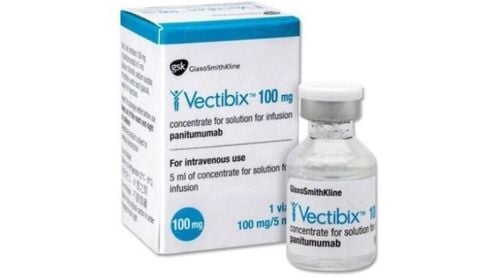This is an automatically translated article.
The article is expertly consulted by a Doctor of Gastrointestinal Endoscopy - Department of Medical Examination & Internal Medicine - Vinmec Da Nang International General Hospital.Bloody stools are not uncommon. It can be a sign of normal constipation but can also be a sign of many other dangerous diseases such as: gastrointestinal bleeding, gastritis, cancer...
1. The phenomenon of bloody stools
Blood in the stool is a phenomenon in which there is blood in the stool or blood in the stool at the end of the yard. Passing out blood is dark red or bright red, even dark. The manifestation of blood mixed in the stool depends on the cause of the disease.Bloody stools can be caused by constipation and go away on their own. This situation is not dangerous. However, blood in the stool can also be caused by a few other more dangerous causes.
2. Causes of bloody stools

Có nhiều nguyên nhân gây đi ngoài ra máu
Causes of hemorrhoids can be: straining while defecating, sitting on the toilet for too long, chronic constipation, stress, chronic diarrhea, obesity, eating less fiber, women with pregnancy...
Improve the condition of hemorrhoids by eating lots of vegetables and fruits, soaking in warm water, having medical treatment or surgically removing hemorrhoids.
2.2. Gastrointestinal fistulas Between the anus and the skin or the anus and rectum can occur, known as gastrointestinal fistulas. This condition can cause digestive juices, pus, or blood to leak out of the body, causing bloody stools.
Gastrointestinal fistulas must be treated with surgery and antibiotic therapy.
2.3. Fissures Bleeding can also occur when there are cracks in the tissues of the anus, rectum or colon leading to bleeding.
To improve this condition, the patient should eat more fiber and substances that soften the stool. If the condition is severe, the patient needs surgery.
2.4. Diverticulitis A diverticulum is a small pouch that bulges from the wall of the colon. Diverticulosis can occur throughout the colon and is particularly common in the left proximal segment of the colon, known as the sigmoid colon.
Diverticulosis is common in people who eat less vegetables, foods that provide fiber, Bleeding diverticulum makes stools with blood. The condition may be self-limiting, intermittent, or persistent. Severe cases of diverticulitis require surgery to remove the diverticulum.
2.5. Colitis The end of the digestive tract is called the colon. In it, the last part of the colon near the anus is the rectum. Colitis, inflammation of the rectum is one of the causes of bloody stools.
Causes of proctitis and colitis include:
Bacterial or parasitic infections Having irritable bowel syndrome Crohn's disease Effects of radiation therapy, chemotherapy Effects of anal sex Constipation Drinking a lot of alcohol 2.6. Gastroenteritis Gastroenteritis can cause stools to be mixed with blood and mucus. Gastroenteritis is usually caused by a bacterial infection. The disease should be treated with fluid replacement, antibiotics, antiviral drugs...
2.7. Sexually Transmitted Infections (STIs) Anal sex has many harmful effects, including an increased risk of anal inflammation, inflammation of the rectum that leads to bleeding.
Depending on the cause due to bacteria, fungi or viruses, the patient needs to use antibiotics, anti-viral drugs, and anti-fungal drugs respectively.
2.8. Rectal Prolapse Elderly people have a greater risk of rectal prolapse than younger people. Rectal prolapse causes blood in the stool, pain in the lower abdomen. The disease needs to be treated with surgery.

Người cao tuổi có nguy cơ sa trực tràng lớn hơn người trẻ
2.10. Colon or rectal cancer Blood in the stools can be a sign of colon or rectal cancer, due to cancer affecting the large intestine or rectum, causing inflammation or irritation leading to bleeding. . Many cases of cancer are caused by polyps that develop.
In addition to bloody stools, colorectal cancer patients have symptoms such as:
Constipation Abdominal pain Abdominal bloating Nausea, vomiting Change in bowel habits Flat and loose stools Urinary incontinence Decreased sudden weight Fatigue 2.11. Gastrointestinal bleeding Gastrointestinal bleeding is also one of the causes leading to blood in the stool
3. When to go to the doctor with blood in the stool?
Blood in the stools can be common and does not require treatment. But if you have bloody stools with a lot of blood, are prolonged or painful, you need to see a doctor to find out the cause and treatment.Patients need to go to the doctor when they have the following signs:
Blood in the stools lasting more than 2 weeks Young children passing bloody stools Tired people Poor health Unexplained weight loss Abdominal pain, swelling in the abdomen High fever Nausea or vomiting Feeling of a lump in the abdomen Abnormal changes in stool shape and texture lasting more than 3 weeks Uncontrolled bowel movements or urination.

Nếu đi ngoài ra máu kéo dài hơn 2 tuần cần đi khám ngay
4. Test for early detection of blood in stool
Blood in the stool can be detected with the naked eye when the condition has progressed. In fact, bloody stools may have happened for a long time, but in such a small amount that you do not notice, even very difficult to see with the naked eye. Therefore, people at risk of colorectal cancer should have a fecal occult blood test.The fecal occult blood test is one of the important and effective tests in colorectal cancer screening. Before performing the test, the patient should avoid eating foods such as: bananas, radishes, herring, foods rich in vitamin C...
If the results are abnormal, the doctor may prescribe a few more methods. Other methods such as colonoscopy, colonoscopy, tomography, magnetic resonance imaging, ultrasound.
Department of Endoscopy - Gastroenterology is one of the key specialties at Vinmec International General Hospital.
Please dial HOTLINE for more information or register for an appointment HERE. Download MyVinmec app to make appointments faster and to manage your bookings easily.













